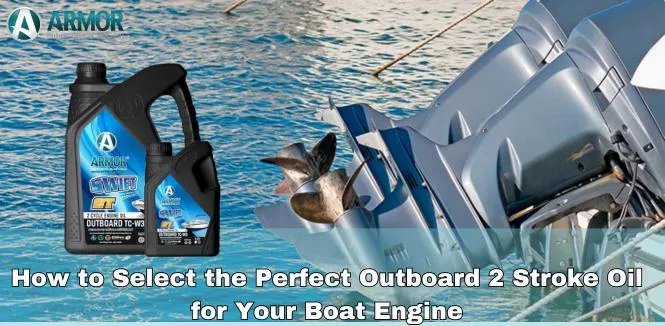- Armor Blog
- Consumer Education
- Rev Up your Outboard Engine with 2 Stroke Outboard Motor Oil
Everything You Need to Know about Outboard Motor Oil

Marine 2-stroke outboard motor oil is designed to withstand the harsh conditions of the marine environment. It is also formulated to resist oxidation and breakdown, which can occur when the oil is exposed to water and salt. Using the right marine 2-stroke outboard motor oil can help to extend the life of your engine and improve its performance.
Consequences of using low-quality 2 stroke outboard motor oil in your outboard engine
The outboard engine is the heart of your boat that enables you to take trips across the sea effortlessly. Inside that heart, several parts are moving and rubbing against each other fast. The friction between the parts produces heat and damages the surfaces, causing them to wear.
While engine oil forms a layer of extra protection for the moving parts, using low-quality oil weakens this protection. Low-quality motor oil is either made from inferior base oil or has insufficient amounts of additives. Either way, the result will not be good for the outboard motor.
The consequences of Using low-quality or incorrect 2 stroke outboard oil in your outboard engine are severe. For instance, the oil may not lubricate or protect the engine adequately, resulting in quicker wear and tear. If not addressed, the issue will evolve to cause a drop in performance and perhaps a catastrophic engine failure.
Benefits of 2 stroke outboard oil
Here are some of the benefits of using the right 2 Stroke Outboard Oil:
- Improved Engine Performance: The right outboard oil can help your outboard motor run more smoothly and efficiently.
- Reduced Wear and Tear: The right Outboard oil can help protect your outboard motor’s components from wear and tear.
- Extended Engine Life: The right outboard motor oil can help extend the life of your outboard motor.
- Reduced Emissions: The right outboard motor oil can help reduce your outboard motor’s emissions.
Marine 2-stroke outboard motor oil essential?
- Marine 2-stroke outboard motor oil lubricates the engine’s moving parts, preventing wear and tear.
- It also helps to cool the engine, preventing overheating.
- Additionally, marine 2-stroke outboard oil helps to reduce emissions, making your boat more environmentally friendly.
Difference between 4 stroke and 2 stoke outboard oil
2 stroke outboard Motor oil and four-stroke oil differ not only in their lubrication systems but also in the additives used. Each type of outboard oil has a distinct set of additives designed to meet the specific requirements of the engine it is intended for.
Marine 2 stroke tcw3 oil typically contains additives that promote engine cleanliness, reduce exhaust smoke, and prevent spark plug fouling. These additives help to maintain the engine’s performance and protect it from damage caused by carbon deposits and other contaminants.
On the other hand, 4 stroke engine oil requires different lubricant additives to provide adequate protection and lubrication. These additives focus on reducing engine wear, preventing deposits, and maintaining engine cleanliness over extended periods of use.
Some common additives found in 4 stroke oil include detergents, dispersants, friction modifiers, and anti-wear agents. These additives help to prevent the build-up of sludge and varnish in the engine, reduce friction between moving parts, and enhance the oil’s flow properties.
Factors to consider when choosing 2 stroke outboard oil
- API and JASO certification: The API (American Petroleum Institute) and JASO (Japanese Automotive Standards Organization) have developed standards for 2-stroke outboard motor oils. These standards ensure that the oil meets certain performance requirements, such as preventing engine wear and emissions. Look for an oil that is certified by both API and JASO.
- Viscosity: The viscosity of an oil is its thickness. Oils with a higher viscosity are thicker and will provide better protection in cold weather. Oils with a lower viscosity are thinner and will provide better fuel economy. The viscosity of the oil you choose will depend on the climate you live in and the type of outboard motor you have.
- Smoke Emission: 2-stroke outboard motors produce smoke when they burn fuel. The amount of smoke produced depends on the type of oil you use. Look for an oil that reduces smoke emissions to help keep your boat clean and reduce air pollution.
- Price: 2-stroke outboard motor oils can range in price from a few dollars to over $20 per bottle. Choose an oil that fits your budget.
- Manufacturer’s recommendations: The manufacturer of your outboard motor will have recommendations for the type of oil that is best for your engine. It is important to follow these recommendations.
Outboard Motor Oil Manufacturer Alternatives?
We completely understand your desire to provide your engine with the best possible protection by using the manufacturer’s recommended oil. However, it’s important to note that there are other high-quality outboard motor oil alternatives available in the market that can provide similar protection and performance.
In fact, opting for a reputable brand with the right type of marine tcw3 2 stroke oil and additives can offer just as much protection and performance as the manufacturer’s recommended oil. By considering the factors we’ve discussed earlier, such as the type of engine, the operating conditions, and the oil’s viscosity, you can make an informed decision and choose an alternative oil that meets your specific requirements.
By following these tips, you can help to keep your outboard motor running smoothly and efficiently for many years to come.
In Conclusion
For those seeking best 10w30 outboard oil, Armor Lubricants manufacturer in the uae provides premium solution designed to enhance outboard engine performance and longevity. Our outboard oils ensure optimum lubrication, reduce engine wear, and protect against harsh marine conditions, keeping your outboard motor running smoothly. Explore our range of outboard oils for your marine needs and experience the performance with globally recognized products.




 Spear Lubricants
Spear Lubricants Armada lubricant
Armada lubricant Ace lubricants
Ace lubricants Perfect lubricants
Perfect lubricants Enzo lubricants
Enzo lubricants Lawrence lubricants
Lawrence lubricants